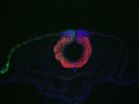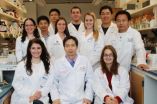(Press-News.org) PASADENA, Calif.—During the early developmental stages of vertebrates—animals that have a backbone and spinal column, including humans—cells undergo extensive rearrangements, and some cells migrate over large distances to populate particular areas and assume novel roles as differentiated cell types. Understanding how and when such cells switch their purpose in an embryo is an important and complex goal for developmental biologists. A recent study, led by researchers at the California Institute of Technology (Caltech), provides new clues about this process—at least in the case of neural crest cells, which give rise to most of the peripheral nervous system, to pigment cells, and to large portions of the facial skeleton.
"There has been a long-standing mystery regarding why some cells in the developing embryo start out as part of the future central nervous system, but leave to populate peripheral parts of the body," says Marianne Bronner, the Albert Billings Ruddock Professor of Biology at Caltech and corresponding author of the paper, published in the November 1 issue of the journal Genes & Development. "In this paper, we find that an important type of enzyme called DNA-methyltransferase, or DNMT, acts as a switch, determining which cells will remain part of the central nervous system, and which will become neural crest cells."
According to Bronner, DNMT arranges this transition by silencing expression of the genes that promote central nervous system (CNS) identity, thereby giving the cells the green light to become neural crest, migrate, and do new things, like help build a jaw bone. The team came to this conclusion after analyzing the actions of one type of DNMT—DNMT3A—at different stages of development in a chicken embryo.
This is important, says Bronner, because while most scientists who study the function of DNMTs use embryonic stem cells that can be maintained in culture, her team is "studying events that occur in living embryos as opposed to cells grown under artificial conditions," she explains.
"It is somewhat counterintuitive that this kind of shutting off of genes is essential for promoting neural crest cell fate," she says. "Embryonic development often involves switches in the types of inputs that a cell receives. This is an example of a case where a negative factor must be turned off—essentially a double negative—in order to achieve a positive outcome."
Bronner says it was also surprising to see that an enzyme like DNMT has such a specific function at a specific time. DNMTs are sometimes thought to act in every cell, she says, yet the researchers have discovered a function for this enzyme that is exquisitely controlled in space and time.
"It is amazing how an enzyme, at a given time point during development, can play such a specific role of making a key developmental decision within the embryo," says Na Hu, a graduate student in Bronner's lab and lead author of the paper. "Our findings can be applied to stem cell therapy, by giving clues about how to engineer other cell types or stem cells to become neural crest cells."
Bronner points out that their work relates to the discovery, which won a recent Nobel Prize in Medicine or Physiology, that it is possible to "reprogram" cells taken from adult tissue. These induced pluripotent stem (iPS) cells are similar to embryonic stem cells, and many investigators are attempting to define the conditions needed for them to differentiate into particular cell types, including neural crest derivatives.
"Our results showing that DNMT is important for converting CNS cells to neural crest cells will be useful in defining the steps needed to reprogram such iPS cells," she says. "The iPS cells may in turn be useful for repair in human diseases such as familial dysautonomia, a disease in which there is depletion of autonomic and sensory neurons that are neural crest–derived; for repair of jaw bones lost in osteonecrosis; and for many other potential treatments."
In the short term, the team will explore the notion that DNMT enzymes may have different functions in the embryo at different places and times. That's why the next step in their research, says Bronner, is to examine the later role of these enzymes in nervous-system development, like whether or not they effect the length of time during which the CNS is able to produce neural crest cells.
INFORMATION:
Additional authors on the paper, titled "DNA methyltransferase3A as a molecular switch mediating the neural tube-to-neural crest fate transition," are Pablo Strobl-Mazzulla from the Laboratorio de Biología del Desarrollo in Chascomús, Argentina, and Tatjana Sauka-Spengler from the Weatherall Institute of Molecular Medicine at the University of Oxford. The work was supported by the National Institutes of Health and the United States Public Health Service.
Developmental bait and switch
Caltech-led team discovers enzyme responsible for neural crest cell development
2012-11-02
ELSE PRESS RELEASES FROM THIS DATE:
Weill Cornell receives $1.5 million in Grand Challenges Explorations grants
2012-11-02
NEW YORK (Nov. 01, 2012) -- Weill Cornell Medical College announced today that it is a Grand Challenges Explorations winner, an initiative funded by the Bill & Melinda Gates Foundation. Researchers at Weill Cornell have been awarded three research grants totaling more than $1.5 million. Weill Cornell's Dr. Juan R. Cubillos-Ruiz, a postdoctoral research associate in medicine in the laboratory of Dean Dr. Laurie H. Glimcher, will pursue an innovative global health and development research project titled, "Tailored Nanodevices to Understand Resistance Against HIV," Dr. Carl ...
New medication shows promise as lipid-lowering therapy for rare cholesterol disorder
2012-11-02
PHILADELPHIA – An international effort led by researchers at the Perelman School of Medicine at the University of Pennsylvania has resulted in positive phase 3 clinical trial results for a new medicine to treat patients suffering from a rare and deadly cholesterol disorder.
Penn researchers report in The Lancet that lomitapide, a first-in-class microsomal triglyceride transfer protein (MTP) inhibitor, substantially and stably reduced LDL cholesterol (the "bad" cholesterol) in patients with the orphan disease homozygous familial hypercholesterolemia (HoFH). Lomitapide ...
Brain imaging alone cannot diagnose autism
2012-11-02
Belmont, MA— In a column appearing in the current issue of the journal Nature, McLean Hospital biostatistician Nicholas Lange, ScD, cautions against heralding the use of brain imaging scans to diagnose autism and urges greater focus on conducting large, long-term multicenter studies to identify the biological basis of the disorder.
"Several studies in the past two years have claimed that brain scans can diagnose autism, but this assertion is deeply flawed," said Lange, an associate professor of Psychiatry and Biostatistics at Harvard Medical School. "To diagnose autism ...
When considering bariatric surgery think about bones
2012-11-02
Bariatric surgery, which significantly curtails the amount of food a person can eat, is the most effective treatment against obesity and is being recognized as a potentially valuable tool in the fight against diabetes related to obesity. It is being performed on increasing numbers of people worldwide, including teenagers.
Unfortunately, some types of bariatric surgery may also cause bone loss, a cause for concern, particularly when carried out on young people who have not yet reached their peak bone mass, say endocrinologists from Sydney's Garvan Institute of Medical ...
Temporary storage for electrons: Natural method of producing hydrogen
2012-11-02
Scientists at the Max Planck Institute for Chemical Energy Conversion (MPI CEC) and the Ruhr-Universität Bochum (RUB) have found through spectroscopic investigations on a hydrogen-producing enzyme that the environment of the catalytic site acts as an electron reservoir in the enzyme. Thus, it can very efficiently produce hydrogen, which has great potential as a renewable energy source. The research team describes their results in the journal "Angewandte Chemie".
Producing hydrogen with enzymes
The system analysed constitutes an enzyme that catalyses the formation and ...
Health project in India saved many mothers and children
2012-11-02
Infant mortality has fallen by half, and the number of women who died from complications during pregnancy and childbirth by three-quarters. This is the result of a four-year health care project in one of India's poorest districts.
"We're overjoyed that mortality could be reduced with relatively simple means like mobile health care centres. It was successful because pregnant women and new mothers got the opportunity to actively seek care."
So says Siw Alehagen who, together with AnnaKarin Johansson, Orvar Finnström and Göran Hermansson – all of Linköping University ...
MRI research sheds new light on nerve fibers in the brain
2012-11-02
World-leading experts in Magnetic Resonance Imaging from The University of Nottingham's Sir Peter Mansfield Magnetic Resonance Centre have made a key discovery which could give the medical world a new tool for the improved diagnosis and monitoring of brain diseases like multiple sclerosis.
The new study, published in the Proceedings of the National Academy of Science, reveals why images of the brain produced using the latest MRI techniques are so sensitive to the direction in which nerve fibres run.
The white matter of the brain is made up of billions of microscopic ...
New finding gives clues for overcoming tamoxifen-resistant breast cancer
2012-11-02
CINCINNATI—A University of Cincinnati (UC) cancer biology team reports breakthrough findings about specific cellular mechanisms that may help overcome endocrine (hormone) therapy-resistance in patients with estrogen-positive breast cancers, combating a widespread problem in effective medical management of the disease.
Xiaoting Zhang, PhD, and his colleagues have identified a specific estrogen receptor co-activator—known as MED1—as playing a central role in mediating tamoxifen resistance in human breast cancer. The team reports its findings in the Nov. 1, 2012, issue of ...
Active surveillance can reduce suffering among men with prostate cancer
2012-11-02
With active surveillance many men with prostate cancer could dispense with radiation treatment and surgery, and thus avoid adverse effects such as incontinence and impotence. This is the outcome of a study of almost 1,000 men diagnosed with prostate cancer conducted at Sahlgrenska Academy, University of Gothenburg, Sweden.
The introduction of PSA tests, which are used to screen for prostate cancer, offers early tumour detection, reducing mortality rates. At the same time, prostate cancer is in many cases a slow-growing form of cancer. Many men may never develop symptoms ...
Don't ignore doubts about marriage, researcher warns
2012-11-02
Couples about to tie the knot shouldn't ignore nagging doubts about getting married, warns a University of Alberta researcher.
"If you are having doubts about the relationship, just ignoring them may make a difference years down the road," said Matthew Johnson who co-authored the study while at Kansas State University. Johnson is now an assistant professor in the University of Alberta Department of Human Ecology.
The study, published recently in the journal Family Process, found that couples who were more confident as they exchanged vows also spent more time together ...
LAST 30 PRESS RELEASES:
A kaleidoscope of cosmic collisions: the new catalogue of gravitational signals from LIGO, Virgo and KAGRA
New catalog more than doubles the number of gravitational-wave detections made by LIGO, Virgo, and KAGRA observatories
Antifibrotic drug shows promise for premature ovarian insufficiency
Altered copper metabolism is a crucial factor in inflammatory bone diseases
Real-time imaging of microplastics in the body improves understanding of health risks
Reconstructing the world’s ant diversity in 3D
UMD entomologist helps bring the world’s ant diversity to life in 3D imagery
ESA’s Mars orbiters watch solar superstorm hit the Red Planet
The secret lives of catalysts: How microscopic networks power reactions
Molecular ‘catapult’ fires electrons at the limits of physics
Researcher finds evidence supporting sucrose can help manage painful procedures in infants
New study identifies key factors supporting indigenous well-being
Bureaucracy Index 2026: Business sector hit hardest
ECMWF’s portable global forecasting model OpenIFS now available for all
Yale study challenges notion that aging means decline, finds many older adults improve over time
Korean researchers enable early detection of brain disorders with a single drop of saliva!
Swipe right, but safer
Duke-NUS scientists identify more effective way to detect poultry viruses in live markets
Low-intensity treadmill exercise preconditioning mitigates post-stroke injury in mouse models
How moss helped solve a grave-robbing mystery
How much sleep do teens get? Six-seven hours.
Patients regain weight rapidly after stopping weight loss drugs – but still keep off a quarter of weight lost
GLP-1 diabetes drugs linked to reduced risk of addiction and substance-related death
Councils face industry legal threats for campaigns warning against wood burning stoves
GLP-1 medications get at the heart of addiction: study
Global trauma study highlights shared learning as interest in whole blood resurges
Almost a third of Gen Z men agree a wife should obey her husband
Trapping light on thermal photodetectors shatters speed records
New review highlights the future of tubular solid oxide fuel cells for clean energy systems
Pig farm ammonia pollution may indirectly accelerate climate warming, new study finds
[Press-News.org] Developmental bait and switchCaltech-led team discovers enzyme responsible for neural crest cell development


